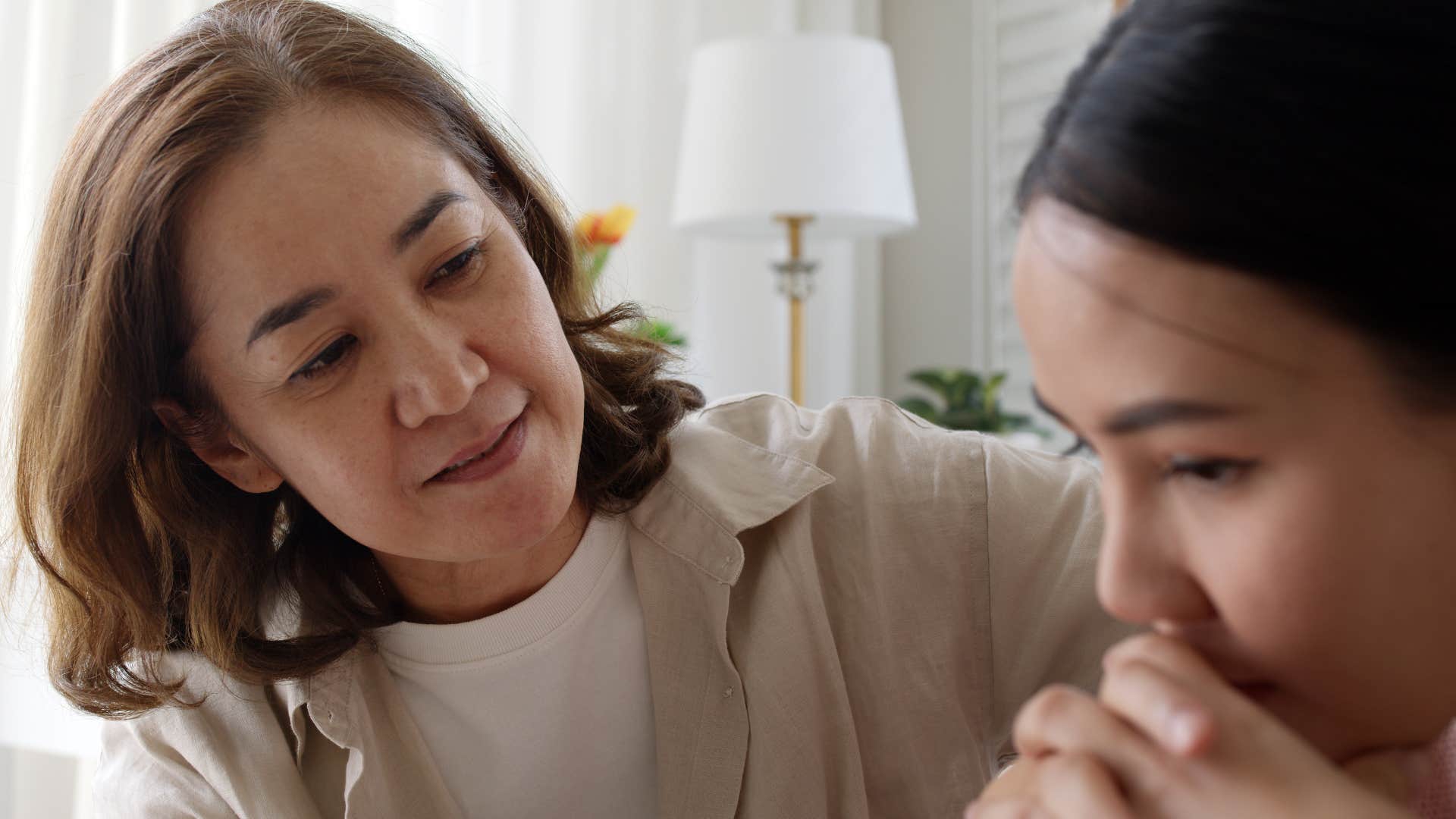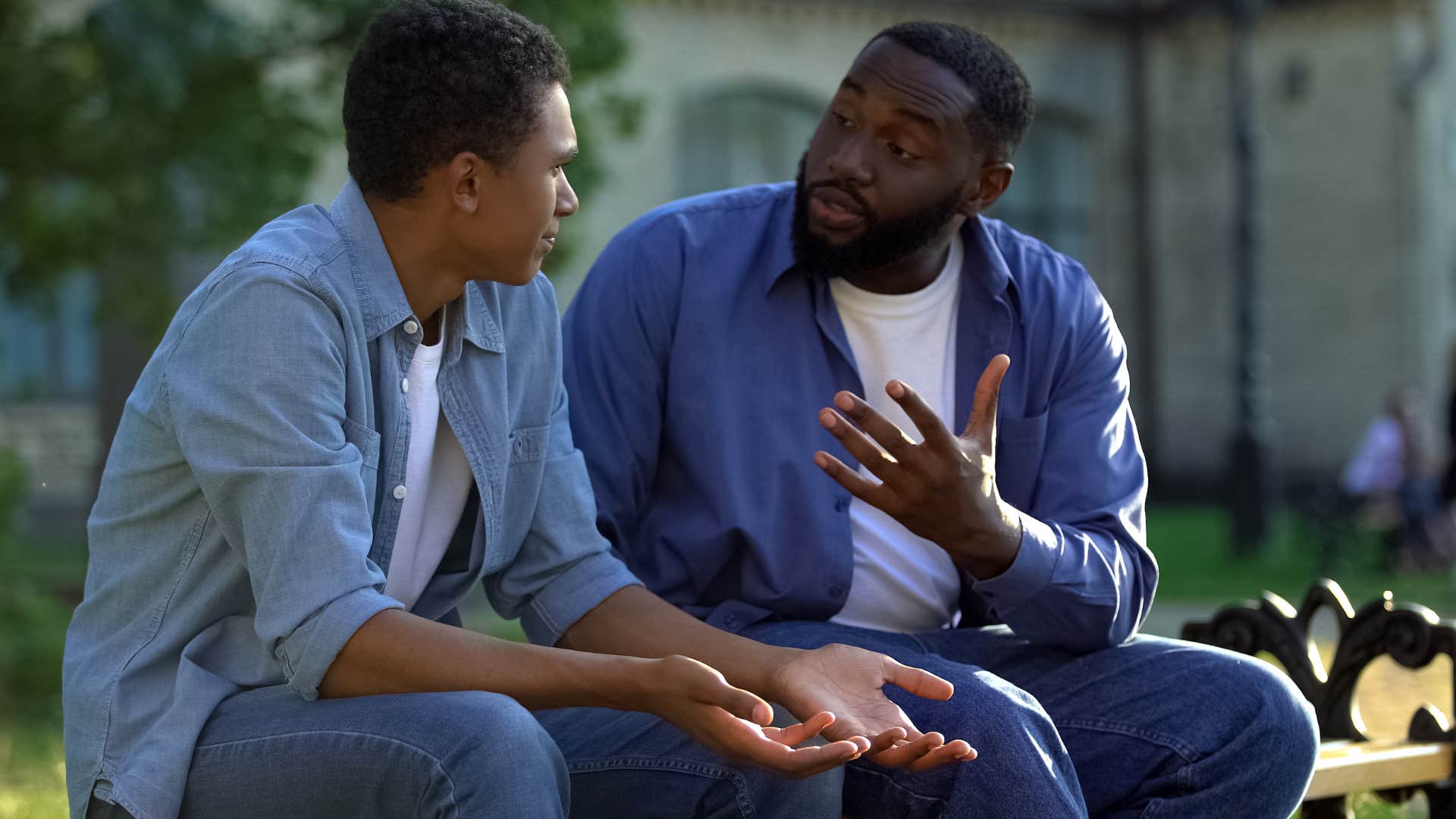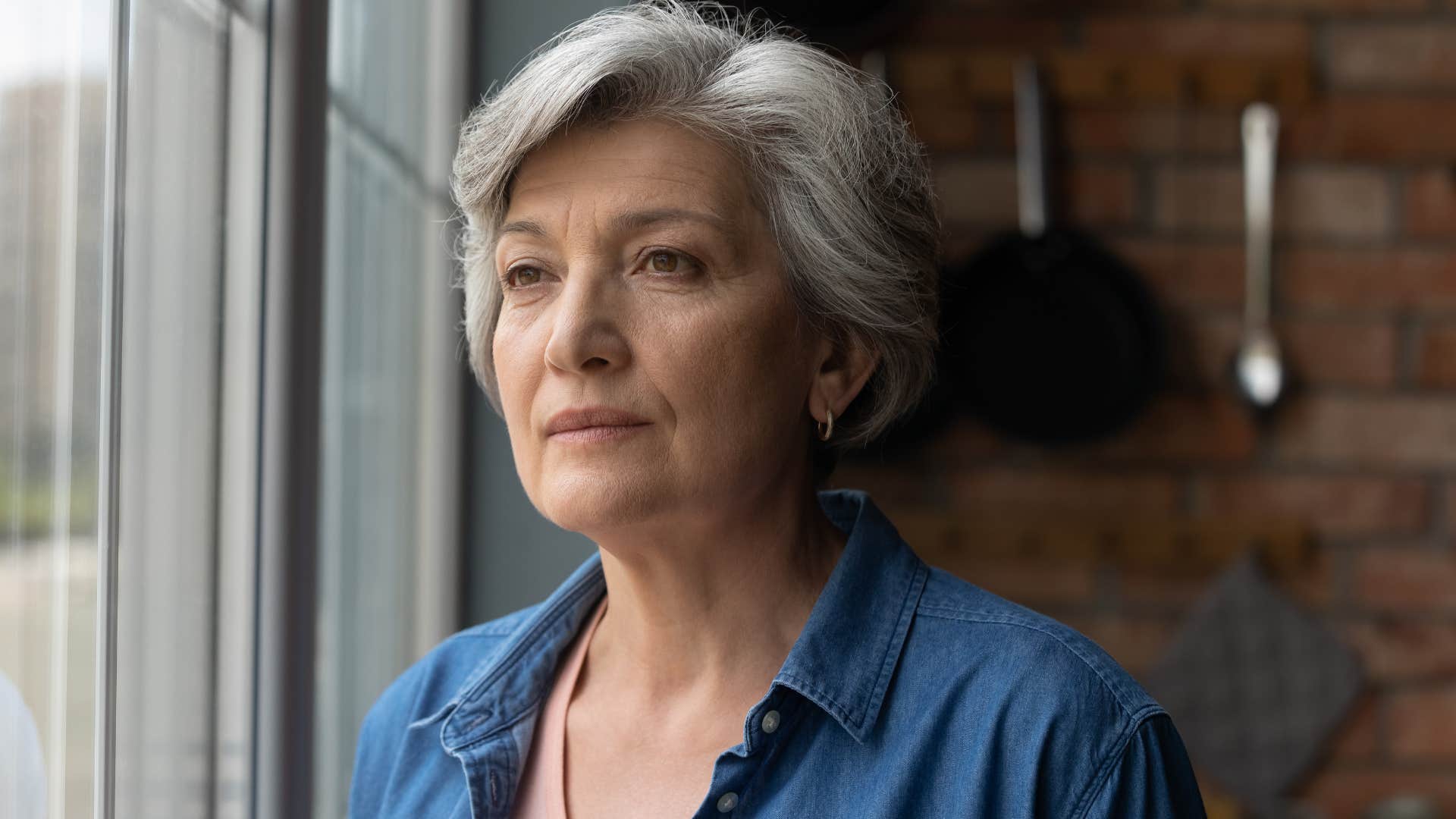11 Things Adults Should Stop Expecting From Their Parents, No Matter What
A healthy parent-child relationship shouldn't feel like an obligation.
 fizkes | Shutterstock
fizkes | Shutterstock A healthy parent-child relationship into adulthood can have a profound influence on each party's health and well-being, according to a study published in Psychology and Aging. But a toxic one can also leave a lasting impact. From lingering childhood trauma, to unhealthy communication, and vague boundaries, there are a lot of experiences that can further exacerbate family disconnect and lingering resentment.
Many of the things adults should stop expecting from their parents, no matter what, contribute to this disconnect and toxicity. When there's an unhealthy balance between parent support and adult children's entitlement, everyone suffers in the long-term, even when it's just unsuspecting and simple habits that build up over time.
Here are 11 things adults should stop expecting from their parents, no matter what
1. Financial support
 fizkes | Shutterstock
fizkes | Shutterstock
Many young adult children today are still reliant on financial support from their parents to survive in adulthood, but this kind of extra income is also one of the things adults should stop expecting from their parents no matter what.
Parents should feel empowered to both help their kids financially, while also setting boundaries around the kind of support they give. When it starts to affect an adult child's independence and growth or encroach on a parent's well-being in their own life, both parties should focus on open communication and setting boundaries to pave a healthier path forward.
2. Rescuing
 My Ocean Production | Shutterstock
My Ocean Production | Shutterstock
Considering many parents still feel drawn to solving their adult children's problems and "rescuing" them from their struggles, it's quite easy for adult children who lack their own emotional regulation and conflict resolution skills to rely on their parents as a constant emotional savior. Of course, this kind of codependency isn't just unhealthy for parents, who should feel free to live their own lives with an autonomous child — it has severe consequences for their children as well.
According to experts from BetterHelp, it's nothing short of enabling, when parents overstep boundaries and give unsolicited advice and support to their kids, especially when they're always asking for it. To truly grow in adulthood and craft an independent life, it's important for adult kids to step outside of their comfort zone and get comfortable resolving their own problems and building a skill set to survive without constant parental supervision and rescue.
Of course, asking your parents for advice and seeking support isn't malicious or inherently bad; in fact, many people have strong bonds and healthy relationships with their parents later in life that add value to their routines. But there should be a limit to the kind of "rescuing" adults expect from their parents, especially when it starts to encroach on independence, autonomy, and well-being.
3. Free housing without boundaries
 Amnaj Khetsamtip | Shutterstock
Amnaj Khetsamtip | Shutterstock
Nearly 20% of young adults under 35 still live with their parents, according to Pew Research Center, so it's not necessarily uncommon for parents and adult children to share a living space later into adulthood. However, living together without healthy habits like open communication or clear boundaries can make a parent-child relationship far more divisive and tumultuous than it needs to be.
Many of the things adults should stop expecting from their parents no matter what revolve around vague boundaries. From privacy at home, to inviting over guests, staying up late, and using shared spaces, it's essential that adult children express their needs and listen to their parents' boundaries when they're living together. Otherwise, it's their independence, well-being, and general health that's at risk.
4. Babysitting at the last minute
 fizkes | Shutterstock
fizkes | Shutterstock
With rising costs of childcare and inaccessible funding for afterschool care, it's genuinely a gift when adult children have grandparents that they can occasionally rely on for babysitting. However, when adult children expect their parents to watch their own kids at a moment's notice, no matter what, without respecting their own independent lives and boundaries, it can create tension and resentment in a family dynamic.
Parents should feel empowered to ask for a break, compensation, or even to avoid babysitting at all, but it takes healthy communication, understanding, and sometimes compromise to healthily achieve. Feeling obligated to grandparents' time as an adult child isn't healthy for anyone.
5. Constant apologies for the past
 Chay_Tee | Shutterstock
Chay_Tee | Shutterstock
Many young people today, with accessibility to the internet and mental health resources, are hyperaware of the link between their childhood experiences and their adult well-being. Of course, having an open conversation with parents about childhood trauma can be necessary to move forward, whether it's characterized by an apology, accountability, or even simple emotional support from a parent.
However, it can quickly transform into a "scapegoat situation" for adult children to blackmail their parents with — expecting constant apologies and acknowledgement for situations that have already been addressed and resolved.
6. Being the same person forever
 ViDI Studio | Shutterstock
ViDI Studio | Shutterstock
We all grow attached to the people we build relationships with — whether they're a parent, a friend, or a peer. We grow attached to their quirks, hobbies, mannerisms, and even aspirations, but it's only human nature to change and evolve over time.
Asking or expecting parents to be the same person they were growing up is not only unrealistic, it's unfair. Adult children change and enter new stages in their lives every other year, but so do parents — so does everyone. Similar to the way adult children expect their parents to respect their autonomy as they enter adulthood, they should offer up the same respect and grace to their parents as they enter new stages of their lives.
7. Patience and understanding
 fizkes | Shutterstock
fizkes | Shutterstock
Patience and endless understanding is one of the things adults should stop expecting from their parents no matter what. Of course, offering up patience or understanding in conversations and interactions is important from time to time — especially in a highly emotional argument or conflict — but always expecting parents to tolerate misbehavior or disrespect can cause lingering resentment and tension.
Like experts from the Newport Institute suggest, clear boundaries are the best way to deal with disrespect, but those boundaries are reliant on a shared understanding that not everyone is worthy of patience, toleration, and understanding — at least, before an empathetic conversation is had.
8. Favoritism among siblings
 Motortion Films | Shutterstock
Motortion Films | Shutterstock
According to research presented by the American Psychological Association, which was published in Psychological Bulletin, parental favoritism isn't a myth. Of course, it has consequences on family dynamics and relationships, but it's still a common experience for parents and their children, even later into life.
However, expecting a parent to continue to show you extra attention, grace, and favoritism later in life is not only unfair, but toxic to a family dynamic. It not only sparks resentment and mistrust between siblings — the kind of family relationships that outlast parents and last for much longer into adulthood — and creates a kind of entitlement and disrespect that's hard to overcome without healthy conversations and habits.
9. Always being accessible
 Ekateryna Zubal | Shutterstock
Ekateryna Zubal | Shutterstock
Expecting any kind of relationship, whether it's a parent or not, to always be 100% accessible and available for you is unrealistic and, in many cases, blatantly toxic. Everyone has their own lives, responsibilities, and habits. If they're always dropping everything for you, without any regard for their own needs or well-being, they're not only crafting a toxically codependent relationship, they're harming themselves.
It's one of the things adults should stop expecting from their parents no matter what. But, of course, they're allowed to ask for help and support, even sometimes taking precedence over their own lives and responsibilities. Still, a pattern of this overstep can cause more harm than good.
10. Their retirement
 fizkes | Shutterstock
fizkes | Shutterstock
It's not uncommon for parents to sacrifice their own financial future or present security for the sake of taking care of their children, according to experts from Moneywise. Sometimes, it can feel unavoidable, as young people are forced to live at home for longer, save money in their parent's homes, and rack up unsuspecting bills like utilities and groceries.
With an acknowledgment of their financial status and clear boundaries, parents can ensure they're protecting their future while also safeguarding their kids' well-being and future stability. However, adult children who expect their parents to offer up financial support and even overlook their own well-being for the sake of their own can craft an unhealthy dynamic.
11. Knowing what you need without a conversation
 fizkes | Shutterstock
fizkes | Shutterstock
Parents aren't mindreaders — they can't sense when their adult children need something or always be available to help guide them through adversity. It's unfair for adult children to hold resentment and guilt over their parents' heads for simply not being there when they need them, especially when they're not communicating their needs or asking for help.
Respect, emotional support, and healthy communication are all two-way streets. Expecting their parents to offer them up at all times, when adult children aren't engaging in them themselves, is a recipe for disaster and discomfort.
Zayda Slabbekoorn is a staff writer with a bachelor's degree in social relations & policy and gender studies who focuses on psychology, relationships, self-help, and human interest stories.

